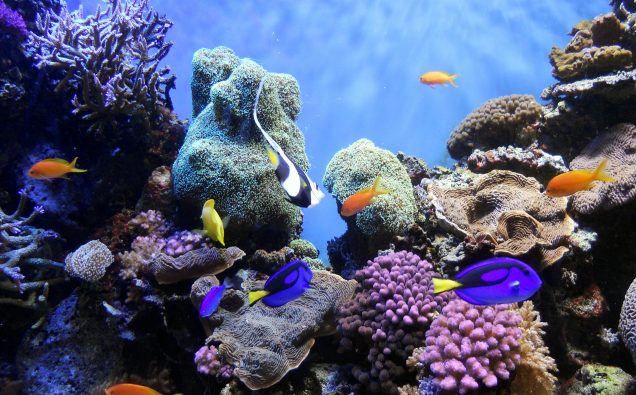
Photo: Underwater world Credit: Fascinating Universe/Wikimedia Commons
Will scenes of colorful ocean life become a thing of the past?
Fear are already rising that the coming generations may not be able to enjoy watching or witnessing fish swim across waters the way we do. Even the latest media gadgets might not help make things clear as there would be more plastic than fish by 2050 in the world’s oceans.
The dire warning comes as people continue to deposit unprecedented volumes of trash into ocean waters, threatening both the oceans and livelihood of millions around the globe engaged in the business of fishing and tourism.
Moreover, the United Nations says, ocean acidification is disrupting the marine food chain and record-level ocean temperatures are killing coral reefs and creating fiercer, more frequent storms.
“The facts are clear. Our oceans are a mess,” United Nations Secretary-General Antonio Guterres said.
He was speaking at an outreach event, that was part of the Group of Seven – or G7 – Summit of industrialized nations, which ended in Charlevoix, Canada.
The G7 group of advanced economies, consists of Canada, France, Germany, Italy, Japan, the United Kingdom and the United States.
Plastic waste is now found in the most remote areas of the planet. It kills marine life and is doing major harm to communities that depend on fishing and tourism, a UN statement says.

The decomposition times of marine debris Photo: Zephyrschord/Wikimedia
Pointing out that one mass of plastic in the Pacific is now bigger than France, Guterres welcomed the G7 Plastics Charter, agreed on Saturday, which is being seen by some observers as a Paris-style watershed moment for cleaning up ocean garbage, referencing the 2015 Agreement on climate change.
“But we all need to do so much more,” the secretary-general underscored, “not just on plastic waste but on all ocean issues.”
“Make no mistake, we are in a battle. And we are losing on every front,” he stressed.
The UN chief painted a picture of fish stocks being crippled by overfishing, vast coastal dead zones from pollution and untreated waste being discharged into the sea.
“And, to compound these issues, we have the growing impacts of climate change,” he asserted, while also pointing out acidification of oceans and its implications.
Moreover, 40 per cent of the world’s population lives within 100 kilometer of a coast – leaving them vulnerable to storms, sea level rise and coastal erosion.
Low-lying island nations and many coastal cities are in jeopardy of inundation, the Secretary-General said.

Pacific garbage patch map Photo: NOAA /Wikimedia Commons
“Thankfully,” Guterres, said, “we have a battle plan.”
“Our guide is the Sustainable Development Goals [SDGs], and especially Goal 14 with its 10 targets from addressing marine pollution and acidification, to ending overfishing and protecting ecosystems,” he elaborated.
“Our legal framework is the United Nations Convention on the Law of the Sea – the world’s ‘constitution for the oceans,’” he added.
MrGuterres noted that while last year’s Ocean Conference at UN Headquarters registered more than 1,300 commitments and partnerships, none of the initiatives and declarations are worth anything “unless we accept that we face a global emergency.”
“And that is why I am here today. To sound the alarm. To inject a sense of real urgency in your deliberations and decision-making,” he said.

















